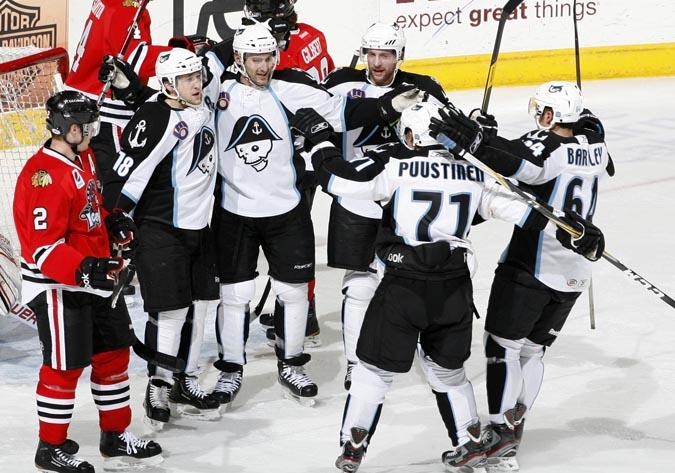by Jason Karnosky || AHL On The Beat Archive
When it comes down a history of success on the ice in the American Hockey League, the Milwaukee Admirals carry few peers.
Since transitioning over from the International Hockey League to start the 2001-2002 season, Milwaukee has earned a staggering 1,014 points, averaging 42.3 wins per campaign. In that span the Admirals have missed the playoffs just once (in its inaugural AHL season), played in two Calder Cup finals (2004 and 2006) and captured one championship (2004).
It is that winning tradition that makes every Milwaukee player proud to take the ice at the Bradley Center donning Admirals sweater.
“Milwaukee’s definitely a winning team in the AHL and that’s our pedigree,” Admirals forward Chris Mueller said. “The team is always in the playoffs and it is an organization that moves its players up to the National Hockey League because its wins games.”
The backbone of that pedigree is the quality of the staff put in place throughout the entire organization. Thanks to its top notch ownership, front office and high quality coaches, Admirals players are always placed in a situation beneficial to their career.
“The people Nashville brings in here from the players to the staff are (the biggest reason) for Milwaukee’s history of success,” Admirals coach Ian Herbers said. “The team (is stocked) with good character people and that’s true throughout the entire organization.”
Herbers is the next in line of a coaching staff that included the likes of Kirk Muller, Claude Noel, Todd Richards and Lane Lambert. Three of those four previous coaches have earned head jobs in the NHL, while Lambert was recently promoted to become an assistant coach with the Predators.
But in order to win games, and Milwaukee has won a lot of them over the past 10 years (447 to be exact), the quality of talent within the organization has to be high.
Every year Nashville fills up its AHL affiliate with skaters ready to compete in the NHL.
“We are an organization (that as a whole) is developed from within and has succeeded from within,” Predators assistant general manager Paul Fenton said. “In order sustain that kind of success in the NHL you need a really strong farm system.”
Making that system run like a well-oiled machine requires the selection of the right prospects in the entry draft. Nashville’s front office goes to great lengths each summer to find players to fit their tenacious style of play.
“The Predators do a good job of drafting guys with good character, who are willing to work and have that relentless mentality the franchise strives for,” former Admirals forward Blake Geoffrion said. “Everyone in our dressing room is like that.”
The ultimate goal of any AHL player is earn a trip to the NHL, just like it is the ultimate goal of AHL teams to foster the development of their prospects. Nashville is an organization that bases its calls up from Milwaukee solely on merit, so that any Admiral, regardless of their background, stands a chance of being promoted to NHL.
“(Chris) Mueller came to Milwaukee two years ago on a tryout contract, yet he ended up playing in some NHL games last year,” Geoffrion said. “If you’re willing to work and put in time learning details, Nashville will give you a shot.”
Like he did last year, Mueller has played his way up to the Predators this season, skating in four games with Nashville. Mueller earned those promotions by leading Milwaukee in scoring with 23 goals and 39 points to date.
“When Nashville calls coach Herbers looking for a player, they want the best player available who is playing the best hockey,” Mueller said. “Guys get rewarded with ice time here and call ups to Nashville based on how well they play.”
Two others players, forward Gabriel Bourque and defensemen Ryan Ellis, have climbed up the ladder from Milwaukee on a long-term basis this season thanks to the merits of their play. Ellis was a highly touted prospect (selected 11th overall in the 2009 entry draft), but Bourque created little fanfare with his fifth round selection (132nd overall) in the same draft.
“It is proud feeling and a relief when your hard work pays off in an NHL promotion,” Mueller said. “Nashville wants hard working guys who will play their way up.”
Complementing Milwaukee’s up-and-coming young talent is a small core of veterans. Though less likely to figure in Nashville’s long term plans, these leaders play a key role in the organization both in terms in victories on the ice and in guiding the development of the organization’s young talent.
“Our farm system is stocked with players with very good upsides, including the veterans,” Fenton said. “They are integrated to compliment the prospects we have down there, but (when an opportunity arises in Nashville) we promote the best player (regardless of their status).”
Admirals captain Scott Ford takes his leadership role seriously and knows if he does his job well, it will only lead to greater visibility from above.
“Our team is built with just a handful of older guys so we know we have to take the reins in the locker room and be the players our young guys can lean on,” Ford said. “We really try to bring everyone together and create a family atmosphere because that leads to success on the ice.”
The result of all of these factors is stable Milwaukee franchise that ranks amongst the AHL’s elite.
Dating back to 2001-02, only Hershey and Chicago have appeared in the Calder Cup finals more times than the Admirals. The Bears and Wolves are the only teams to win more championships during that span, with Hershey taking home the Calder Cup in 2006, 2009 and 2010, while Chicago claimed a pair of titles in 2002 and 2008.
Only Hershey owns more points (1,034) than the Admirals over that same time period, and only one team, Wilke-Barre/Scranton, can match Milwaukee’s current run of nine straight postseason appearances.
“Milwaukee is a great place to be,” Ford said. “It is easy to come to the rink, work hard every day and have success when you have an ownership and a city that supports you like we do.”






































